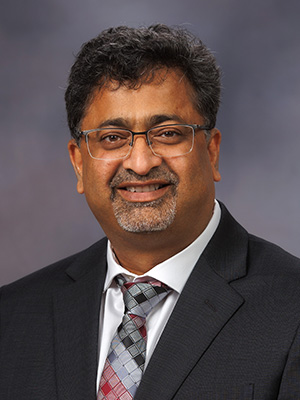Dr. Ajay Singh named professor in cell & molecular biology and associate director of basic and translational research

Dr. Ajay Singh is a new professor in the Department of Cell & Molecular Biology and the associate director of basic and translational research for the Cancer Center and Research Institute (CCRI). Singh will be responsible for strategic planning and operations to drive growth and enhance the CCRI's research mission while ensuring alignment with its clinical objectives. He will also provide guidance on planning and developing the submission of a Cancer Center Support Grant (CCSG) and on building research networks within the UMMC system and with mission-aligned external partners. Additionally, he will assist in recruiting and retaining top cancer scientists and in planning and implementing future facility and infrastructure enhancements.
Previously, Singh served as a professor and director of Research in the Department of Pathology and as a program leader for Cancer Biology and Cancer Health Disparities at the Mitchell Cancer Institute, both at the University of South Alabama. He also held tenured and adjunct professor roles in Oncologic Sciences and Biochemistry and Molecular Biology at the University of South Alabama.
Singh holds a Ph.D. in life science from Devi Ahilya University, India, and a Master’s degree in biotechnology from Aligarh Muslim University (AMU). He also served as a research fellow in the Department of Biochemistry at AMU and conducted research at the Central Institute of Medicinal and Aromatic Plants (CIMAP) in India. His postgraduate training includes roles as a research associate, and a post-doctoral fellow in the Department of Biochemistry and Molecular Biology at the University of Nebraska Medical Center.
Singh’s extensive research addresses critical cancer-related issues and health disparities. He has authored 140 journal articles and presented more than 152 abstracts. As a journal reviewer, he has contributed to a wide array of prestigious publications, including ACS Nano, Cancer Research, Clinical Cancer Research, PNAS, and the Journal of Controlled Release, among others. His review work spans numerous fields, such as cancer research, pharmacology, and molecular biology, and biomedical engineering. He also actively serves on national and international grant study sections and is a member of the editorial boards of several scientific journals.
Singh is currently leading several prominent research projects. Recently, he was awarded over $2.5 million dollars in research funding by the Department of Defense for two projects that study the effect of nicotine on prostate tumor biology and the biological basis of prostate cancer racial disparities. Additionally, he received a $100,000 grant from the Breast Cancer Research Foundation of Alabama to investigate mechanisms of endocrine resistance in breast cancer. He is also involved in a collaborative study on how stress affects breast cancer’s immune landscape, supported by a $100,000 grant from Breast Cancer Research Foundation of Alabama. Previous support includes multiple grants totaling over $10 million from the National Cancer Institute, National Science Foundation, Department of Defense, and state and private funding agencies for pancreatic, prostate, breast, and ovarian cancer research and building research infrastructure.
In addition to his research achievements, Singh holds several patents centering on cancer detection and treatment. He recently filed a patent for detection of mitochondrial DNA mutations in circulating extracellular vesicles as a method for early cancer detection. Other patents are on the methods and compositions for cancer diagnosis, classification and treatments. To commercialize his research findings, he co-founded a startup company, Tatva Biosciences LLC, which was successful in receiving two small business innovative research (SBIR) contracts from the National Institutes of Health.
“I am thrilled to join the CCRI leadership team and work toward making it an NCI-designated cancer center. My focus will be to build upon the existing strengths of the CCRI and UMMC, recruiting exceptional talent to further enhance our capabilities, and driving innovative research that addresses the unique needs of Mississippians,” said Singh. “The goal is to propel UMMC to the forefront of cancer research, delivering groundbreaking discoveries and transformative care to our communities.”


